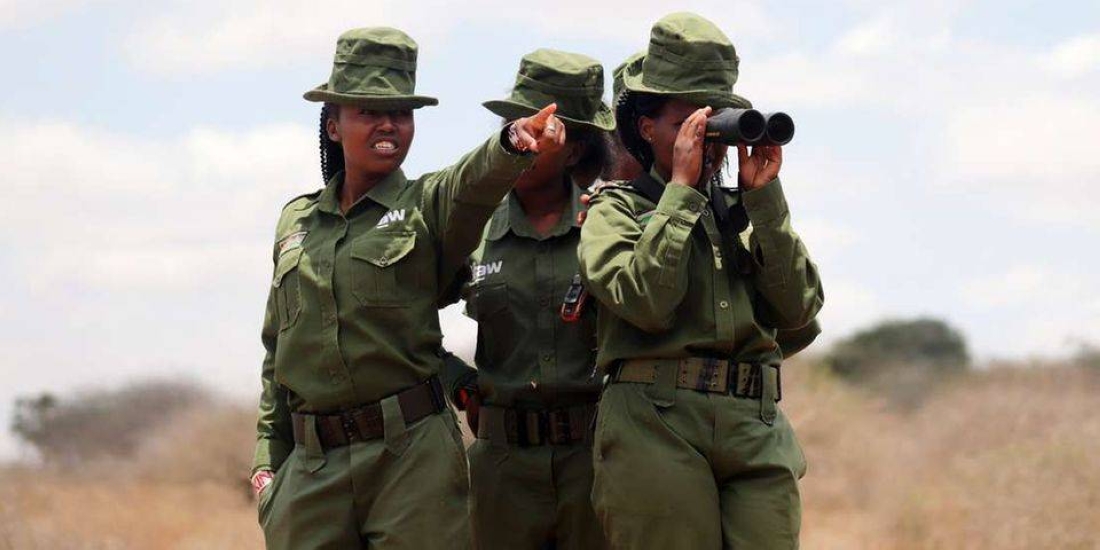Without any other weapon than their mental and physical strength, these female members of “Team Lioness” identify lions, elephants and hyenas, among others, in southern Kenya. Their main mission is to fight against poaching. In doing so, they break down prejudices.
“I wanted to become a ranger to change the perception of my community”: in Kenya, Maasai women patrol the vast plains at the foot of Kilimanjaro, tracking down poachers but also prejudices in a society that is still very patriarchal.
Under a blazing sun, members of Team Lioness, all from the Maasai community, move in khaki outfits near Amboseli National Park, in southern Kenya.
The group stops, signals silence. Above a tree, a giraffe appears, followed by a second. One of the team members grabs a walkie-talkie: “We saw 28 elk, 18 zebras and 6 giraffes.”
Team Lioness, who does not carry weapons, takes stock of the many animals - hyenas, lions, elephants - that live in the region. And also has to deal with poaching.
“In 2022, we arrested a man with a machete who had just killed a giraffe,” recalls Purity Lakara, 27, head of the rangers.
But for the 17 female rangers, one of the main difficulties is responding to the persistent prejudices of the Maasai community, a people living in southwest Kenya and northern Tanzania.
"My community believes that a woman cannot perform demanding physical work. My community believes that women are always weak", lists Purity Lakara, continuing that the role assigned to women is to "stay at home, give birth, milk cows and goats. But very little for her: “I wanted to become a ranger to change the perception of my community,” she assures.
When she announced that she wanted to become a ranger to "protect nature", the family of Sharon Nankinyi, 23, told her that it was "impossible" and that she should be content with "giving birth and go get wood and water.
But she perseveres and also manages to gradually be accepted by her community: "They saw us walking in uniform for long distances (...). We socialized with them, we interacted with them and it's like "We showed them what we were capable of," she prides herself, describing herself as "a courageous woman, a Maasai, who became a ranger."
Naiswaku Parsitau looks at the herd of goats grazing outside Risa, a small village of around 500 inhabitants. For several days, hyenas have been roaming nearby. “People don’t sleep because of this,” says Naiswaku Parsitau, 70, a Maasai community leader.
“When we have these problems, we call the rangers and they patrol at night to protect the herd,” she declares, while ensuring that she had “doubts” at the beginning about Team Lioness, but that they were "rapidly raised". “They help us a lot, and they can inspire other women,” she smiles.
Saitrbru Kimakori, 39, also had “doubts”. “We thought that only men could deal with lions, elephants and nighttime incidents. But they intervene even when we call them at 2 a.m.,” he concedes.
Team Lioness was created in 2019 at the initiative of the International Fund for Animal Welfare (IFAW), an NGO which pays the rangers' salaries.
“At first there was strong resistance, many men didn't want to see women in uniform, and it was a mountain they had to climb to prove what they were capable of,” recalls James Isiche, director for IFAW Africa. “But they proved their capabilities, and resistance was gradually lifted,” he continues.
In the shade of a tree, Kenneth Saei, 56, community leader of the small town of Endoinyoenkai, considers that "in every profession there are women." “In engineering, there are women, in law, there are women, even pilots who bomb in other countries, there are women – so why not this profession?”, notes -he.
When ranger Sharon Mumbi, 21, returns to Endoinyoenkai, where she is from, she swaps her uniform for traditional attire. “I’m the only female ranger in our area,” Sharon smiles, considering herself a “role model.”











